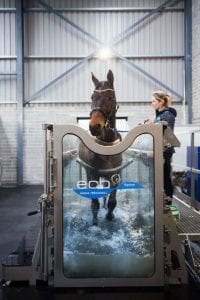New guidelines endorsed by British Equestrian (BEF) have been published to highlight best practice in the use of water treadmills to train and rehabilitate horses.

The document ‘Equine Water Treadmills – a guide for users’ provides recommendations about how to introduce horses to water treadmill exercise, what to look for when a horse is exercising on a water treadmill and suggestions as to how to incorporate it into a training or rehabilitation programme.
It follows research, supported by the BEF, Petplan Charitable Trust and the Animal Health Trust, by the Equine Hydrotherapy Working Group comprising academics, veterinary surgeons and therapy centre managers from the UK, the Netherlands, Germany, Belgium, the United States and China.
Dr Kathryn Nankervis, who leads equine research at Hartpury, and has been using a water treadmill for over 20 years, said; “The guidelines provide a consensus in relation to best practice in the use of water treadmills, based on a combination of research studies and skilled user experience. I’m very pleased to have contributed to the guidelines along with colleagues who all believe in sharing best practice based on evidence. We hope owners and hydrotherapy users will find them useful and horses will benefit from them.”
Dr Rachel Murray, BEF World Class programme veterinarian and co-investigator in current water treadmill research explains; “Performed optimally, water treadmill exercise has many potential benefits when integrated into a training or rehabilitation programme, including an increase in range of movement of lower limbs, increased lumbar flexion, decreased impact shock, improved posture, core and hindlimb muscle development and an opportunity to cross-train in a controlled environment.
“The purpose of the water treadmills guidance document is to help users achieve these benefits for their horses, whether they are using a water treadmill for training or to support a rehabilitation programme.”
Search
Recent Articles
Categories
- Advice Hub
- Athlete
- Carriage Driving
- Dentistry
- Dressage
- Endurance
- Eventing
- Farrier
- Featured
- Featured Horse Ads
- Featured Posts
- Horse Racing
- Horse's Mouth
- Horseball
- Hunting
- Le Trec
- Leisure Riders
- Mounted Games
- Nutrition
- Polo
- Polocrosse
- Reining
- Rescue & Rehabilitation
- Show Jumping
- Showing
- Tack Room
- Team Chasing
- The Pony Club
- Therapy
- Training
- Vaulting
- Veterinary




